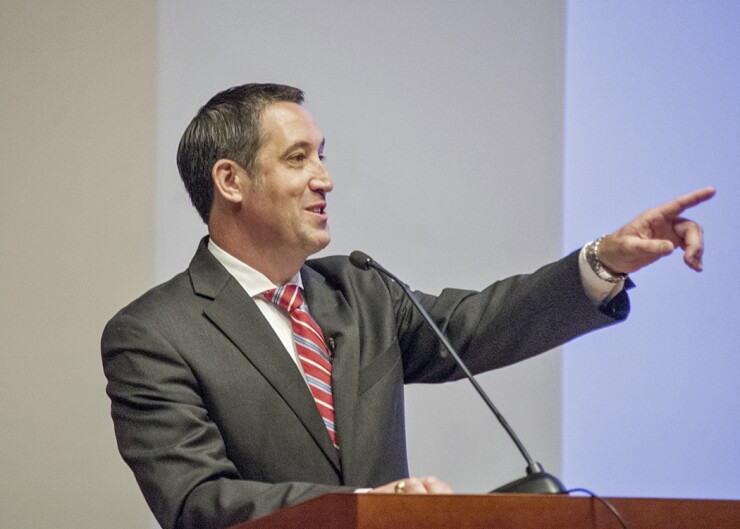AUSTIN — Texas came through the oil price collapse of 2014 with its economy running strong, but economic experts are hedging their bets around the threat of a pandemic on top of other risk factors.
“There’s a difference between uncertainty and risk,” Keith Phillips, senior economist at the Federal Reserve Bank of Dallas, told The Bond Buyer’s Texas Public Finance Conference. “Risk is when you can calculate the impact of certain events based on information that’s available. With uncertainty you can’t. With an event like the coronavirus, we have no idea. There’s just not enough information.”

Texas Comptroller Glenn Hegar said COVID-19 may be causing an overreaction.
“If you look at the number of people who have died, the regular flu has caused a larger number of deaths,” he said.
Despite that, Hegar is warning that Texas’ growth rate will likely slow amid oil prices flattening around $50 per barrel and trade issues that include the China quarantine.
Nueces County Judge Barbara Canales, based in Corpus Christi, the nation’s largest energy exporting port, said she is hearing worrisome reports about China’s demand for liquefied natural gas from the Eagle Ford Shale in South Texas.
Christi Craddick, a member of the Texas Railroad Commission that regulates oil and gas in the state, said that production in the Permian Basin and Eagle Ford Shale regions of west and south Texas will remain a major pillar of the state’s economy and called for more infrastructure to get the oil and gas to market.
“We need pipelines, we need roads, we need rail, we need electricity,” she said.
During the conference, which concludes Wednesday, Treasury yields fell to record lows after a thousand-point drop in the Dow Jones Industrial Average.
“What a great time to borrow money,” said Ron Davis, managing director of BofA Securities Inc. “It’s essentially almost free.”
Despite the viral epidemic and the shutdown of transportation from China, Phillips said the U.S. could very well avoid a recession this year. The yield curve inversion that happened last September is a clear signal of a coming recession, but does not tell us when that will come.
“The yield curve turning positive doesn’t mean there won’t be a recession,” he said.
Although Texas remains a solidly triple-A rated state, growth will continue to pressure the Legislature’s ability to keep up, analysts said.
“State revenue will not keep pace with increased demand for state funding of education and transportation during the next 10 years, suggesting changes in the state’s tax or spending structure will need to be made,” Moody’s analyst Nicholas Samuels said.
Texas will also face a greater need to confront social issues such as high poverty and the nation’s highest healthcare uninsured rate, especially if it continues drawing new residents from other states.
Phillips cited a historically tight labor market and strong consumer spending in Texas working against declining business investment and a weakening energy sector.
Texas employment will grow 2.1% in 2020, according to an annual forecast by the Federal Reserve Bank of Dallas. That’s close to the 2% rate of job growth the Dallas Fed estimated in 2019.
Median home prices in Texas this year could grow at twice the rate of 2019 increases, according to the Real Estate Center at Texas A&M University.
“Last year, for the first time in Texas history, we exceeded $100 billion in housing sales,” said James Gaines, chief economist for the Real Estate Center. “We are looking for prices to increase this year probably between 5% and 6% after 3% last year.”
The decade that ended in 2019 was the best on record for housing across the state, according to the center’s latest report.





